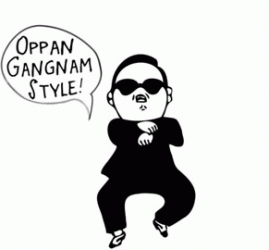We all understand that without fans, there would be no stars, but how much power do fans really have? Discuss the power of a fan/consumer and what this could entail (how much impact do we have)?
Obviously, there would be no stars if they don’t have fans. Fans are groups of people from worldwide, gathering together with same interests, goals and having the same particular idol they follow. There is no doubt that fans would always support and protect their idols from many dimensions, such as buying CDs, photo albums and do things they believe are supportive to their idols, etc. As the fan groups becoming bigger and bigger, their influences widen globally. In my opinion, power of fans is unaccountable, which can be both positive in transnational cultural and negative in the producing of anti-fans.
Positively speaking, it is a good thing that fans from worldwide are producing transnational culture fandom while sharing their culture with fans from different countries. The influence of fans is creating this transnational cultural fandom which becomes a product of Korean fans and non-Korean fans consist different culture and media (Thussu 2007). It allows fans interacting their socio-cultural background with other fans, which studies have found that “fans are enjoying textual and intertextual play with cultural products” (Lee 2016). In addition, fans can be valuable in creating their own fan culture, which also is the product of transnational cultural fandom. In the fan culture, there are norms are created, such as fans have to buying certain supporting items to identify themselves from the rest of non-fan group, especially in young teenage girl and it is defaulting to purchase the unique light stick to hold in their idol’s concert.
However, the dark side of the fan culture which is the product of the anti-fans. Anti-fan is originated in Korea, which form by a group of people who dislike a particular artist and making threat to the artist directly or indirectly. They could do things that are totally unethical, emotionally and sometimes physically harmful to the artists and to their real fans. The reason why people turn into some anti-fans can be as simple as the little unsatisfactory of the performance by the artists. In 2006, Jung Yunho from super junior drunk a drink contains super glue which send by anti-fans, and was send to the emergence room for surgery and got safe eventually; in the same year, because the performance by SJ in Korea MCB was not gone well as expected, anti-fan smashed their car window of on their way out while SJ members, Kim Ki-bum and Lee Dong-hae, were sitting in the car and they got injured by the broken glasses. However, SJ still apologize for their performance after this incident, anti-fans were not showing any sympathy and even become more malicious. This damage of anti-fans is tragical to every artist and unforgettable to every fan who deeply love their idols.
References
Lee, Hye Kyung. 2016. Ashgate research companion to Fan Cultures: Transnational Cultural Fandom, 2016.
Thussu, D.K. (ed.) 2007. Media on the Move: Global Flow and Contra-Flow. London: Routledge. Tsai, E. 2007. Caught in the terrains: An inter-referential inquiry of trans-border stardom and fandom. Inter-Asian Cultural Studies, 8(1), 135–54.


Hey, Shiruo!
I also think the power of fans are accountable both in real fans and anti-fans.
For real fan, it is exactly that each idol’s fans may from different countries, and they can share their culture together to make fandom become bigger and international. It is also a good way to make a higher reputation for idol.
For example, when I went to a Chinese idol’s concert in Vancouver, there were so many fans before starting and they came from different countries. I feel excited in that time because there were lots of people like my idol. One of fans from Korea and we talked with each other because our seats were close. She said even though we from different country, I always focused on his social media and I wanted to go his every concert. In that time, I feel the power of fans. They can spend time and money to his/her idol, I think there are lots of fans in this world have the same concept with this Korean fan. Another example is if we open some idol’s Instagram and the comment are a lot of different languages but all of those comments are supporting their idol. Sometimes, lot of non- Korean fans try to learn Korean words and write the comment in Korean. It is amazing!
In other hands, anti-fans’ are powerful as well. Sometimes there were some horrible people who do not like an idol. And then they attempt to make dirty words on their Instagram and curse them. It may let those idols feel depress when they receive those negative comments. I know about there was a Korean vocal called Jonghyun, but he already dead. The reason is he feel unhealthy in his mind and he feel hopeless. There was so much pressure from his agency and anti-fans. He could not feel relax anymore. So I think the power of fans is unaccountable, too.
I totally agree that fans are really important to the stars. The more of the fans have, the more famous of that star is. The fans can support their stars mentally and financially as what Shiruo mentioned. Apart from that, I think Youtube is also a great platform for the fans to show their supports. When a new music video come out, the fans will watch immediately and try their best to break the viewing rates at certain amount of time. They will share their star’s video in order to increase the views significantly. They will also compare the views with music videos from other well-known stars, which look like a competition. On the other hand, some of the fans will support their stars by following what their stars do, such as donation and volunteering. They want to show other people how kind and good the idol is. Some fans just follow wherever the stars go so that they can stand by them. For example, they will go to the airport when the idol leaves or comes back to the country. We can see that the fans can be very powerful in supporting their stars.
Hey Shiruo,
I see some great discussion points happening in this article but I just wanted to mention a couple things so you can improve your essay before I officially mark them on Saturday:
1) I think it would be nice to elaborate more on why anti-fans could be harmful for the idols since the points you have mentioned could be caused by sasaeng fans who in fact love their idols but just a little too much. Since you specifically mentioned anti-fans, how do they uniquely affect idols? You’ve got great examples of SJ but it would be awesome if you could elaborate without generalizations in order to strengthen your argument.
2) You might also need to flesh out your argument since all it says is that the power of fans are unaccountable. In what ways is it unaccountable? Are there too many variables? Are there not enough variables? In my opinion, even if it is actually unaccountable, properly stating a position is encouraged since the current argument could be considered weak, and on top of that you do not have a conclusion that sums up your position and could finalize the essay for your argument. A conclusion will reaffirm your position for the readers while also strengthening your argument, which currently needs a little improvement.
Other than that, there are just minor grammatical errors with some spelling errors (it is actually MBC, if you were talking about the broadcasting channel in Korea). Don’t worry about it too much since it isn’t a major part of your grade but make sure to go back and edit the essay since grammatical or spelling errors will distract the readers while a lack of errors will strengthen your essay without significant changes to the essay.
I agree with your response on the way that fandom in k-pop has had a positive effect on culture. It allows people from other regions of the world to be attracted to a Korean production filled with Korean produced goods.
In terms of the music produced by groups, it seems to be the case that the major producers are able to create music that many people enjoy. To my knowledge there has not been a major fan revolt in this regard. The power of the fans rests more in keeping k-pop performers on their toes, and up to the “idol” standard that they must meet. As such, we find that what we may consider in western culture to be minor offenses, Korean idols are criticized much more harshly.
It is unfortunate that the element of anti-fans also exists. I also think at the same time that there are extremely high standards that Korean pop idols are held accountable to, and that they are often times impossible to meet. This means that it is easier for people to have a dislike for a certain person or group, when compared with a western artist.
Like you mentioned, K-pop also creates a culture for the fans. As we heard in lecture today, at live events in North America fans camped outside arenas for days to have a lower ticket number. This required dedication by fans to both stake it out in tents, and also to devise and maintain a system of governance that could be agreed and relied upon.